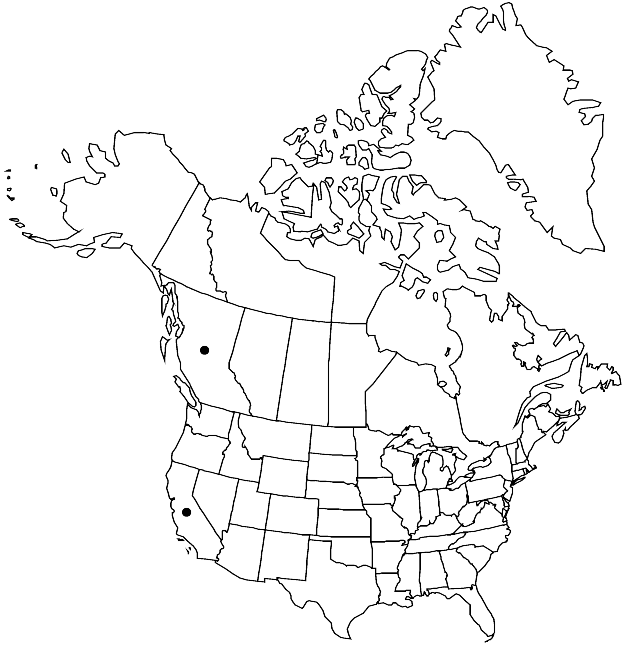Difference between revisions of "Limnanthes macounii"
Mem. Boston Soc. Nat. Hist. 4: 85. 1888.
FNA>Volume Importer |
imported>Volume Importer |
||
| (6 intermediate revisions by 2 users not shown) | |||
| Line 8: | Line 8: | ||
}} | }} | ||
|common_names=Macoun’s meadowfoam | |common_names=Macoun’s meadowfoam | ||
| + | |special_status={{Treatment/ID/Special_status | ||
| + | |code=E | ||
| + | |label=Endemic | ||
| + | }}{{Treatment/ID/Special_status | ||
| + | |code=C | ||
| + | |label=Conservation concern | ||
| + | }} | ||
|basionyms= | |basionyms= | ||
|synonyms= | |synonyms= | ||
| Line 25: | Line 32: | ||
|distribution=B.C.;Calif. | |distribution=B.C.;Calif. | ||
|discussion=<p>Of conservation concern.</p><!-- | |discussion=<p>Of conservation concern.</p><!-- | ||
| − | --><p>Limnanthes macounii is native on Vancouver Island and adjacent islands in British Columbia from East Sooke Park to Victoria, Inskip, Chatham, and Trial islands, to Yellow Point, Saltspring, Gabriola, and Hornby islands. It grows in seasonally moist depressions (including edges of vernal pools) in acidic soils that often have a high nutrient content. The population in California is in an agricultural field in San Mateo County; first discovered there in 1998 (E. G. Buxton 1998), it appears to be persisting. Phylogenetic analyses suggest this may be an aberrant population of L. douglasii (S. Meyers, pers. comm.)</p><!-- | + | --><p><i>Limnanthes macounii</i> is native on Vancouver Island and adjacent islands in British Columbia from East Sooke Park to Victoria, Inskip, Chatham, and Trial islands, to Yellow Point, Saltspring, Gabriola, and Hornby islands. It grows in seasonally moist depressions (including edges of vernal pools) in acidic soils that often have a high nutrient content. The population in California is in an agricultural field in San Mateo County; first discovered there in 1998 (E. G. Buxton 1998), it appears to be persisting. Phylogenetic analyses suggest this may be an aberrant population of <i>L. douglasii</i> (S. Meyers, pers. comm.)</p><!-- |
| − | --><p>The angular and comparatively massive tubercles of the nutlets of Limnanthes macounii, with the base equaling 1/4–1/3 the width of the nutlet, are unique in the genus (H. H. Hauptli et al. 1978). Allozyme studies by R. V. Kesseli and S. K. Jain (1984b) showed that L. macounii had alleles found in no other taxa at three loci. M. S. Plotkin (1998) concluded that L. macounii should be included in L. douglasii based on ITS analysis. Because of its unique characteristics and highly disjunct distribution, L. macounii is maintained as a species here pending further study.</p> | + | --><p>The angular and comparatively massive tubercles of the nutlets of <i>Limnanthes macounii</i>, with the base equaling 1/4–1/3 the width of the nutlet, are unique in the genus (H. H. Hauptli et al. 1978). Allozyme studies by R. V. Kesseli and S. K. Jain (1984b) showed that <i>L. macounii</i> had alleles found in no other taxa at three loci. M. S. Plotkin (1998) concluded that <i>L. macounii</i> should be included in <i>L. douglasii</i> based on ITS analysis. Because of its unique characteristics and highly disjunct distribution, <i>L. macounii</i> is maintained as a species here pending further study.</p> |
|tables= | |tables= | ||
|references={{Treatment/Reference | |references={{Treatment/Reference | ||
| Line 38: | Line 45: | ||
-->{{#Taxon: | -->{{#Taxon: | ||
name=Limnanthes macounii | name=Limnanthes macounii | ||
| − | |||
|authority=Trelease | |authority=Trelease | ||
|rank=species | |rank=species | ||
| Line 52: | Line 58: | ||
|publication title=Mem. Boston Soc. Nat. Hist. | |publication title=Mem. Boston Soc. Nat. Hist. | ||
|publication year=1888 | |publication year=1888 | ||
| − | |special status= | + | |special status=Endemic;Conservation concern |
| − | |source xml=https:// | + | |source xml=https://bitbucket.org/aafc-mbb/fna-data-curation/src/2e0870ddd59836b60bcf96646a41e87ea5a5943a/coarse_grained_fna_xml/V7/V7_213.xml |
|genus=Limnanthes | |genus=Limnanthes | ||
|section=Limnanthes sect. Limnanthes | |section=Limnanthes sect. Limnanthes | ||
Latest revision as of 23:32, 5 November 2020
Plants 2–7(–15) cm. Stems decumbent (sometimes upcurved apically). Leaves 1–7 cm; leaflets 3–15, blade ovate, margins irregularly toothed to 5-lobed. Flowers bowl- to bell-shaped; sepals (4) ovate, 3–4 mm; petals (4) white, cuneate to obovate, 4–5 mm, apex emarginate (reflexed in fruit); filaments 2–2.5 mm; anthers cream, 0.3 mm; style 3 mm. Nutlets light brown, 3 mm, tuberculate, tubercles light brown, broadly conical. 2n = 10.
Phenology: Flowering Mar-early May.
Habitat: Depressions in shallow soil on rocks, seepage areas, rocky coastal areas, open forests
Elevation: 0-200 m
Discussion
Of conservation concern.
Limnanthes macounii is native on Vancouver Island and adjacent islands in British Columbia from East Sooke Park to Victoria, Inskip, Chatham, and Trial islands, to Yellow Point, Saltspring, Gabriola, and Hornby islands. It grows in seasonally moist depressions (including edges of vernal pools) in acidic soils that often have a high nutrient content. The population in California is in an agricultural field in San Mateo County; first discovered there in 1998 (E. G. Buxton 1998), it appears to be persisting. Phylogenetic analyses suggest this may be an aberrant population of L. douglasii (S. Meyers, pers. comm.)
The angular and comparatively massive tubercles of the nutlets of Limnanthes macounii, with the base equaling 1/4–1/3 the width of the nutlet, are unique in the genus (H. H. Hauptli et al. 1978). Allozyme studies by R. V. Kesseli and S. K. Jain (1984b) showed that L. macounii had alleles found in no other taxa at three loci. M. S. Plotkin (1998) concluded that L. macounii should be included in L. douglasii based on ITS analysis. Because of its unique characteristics and highly disjunct distribution, L. macounii is maintained as a species here pending further study.
